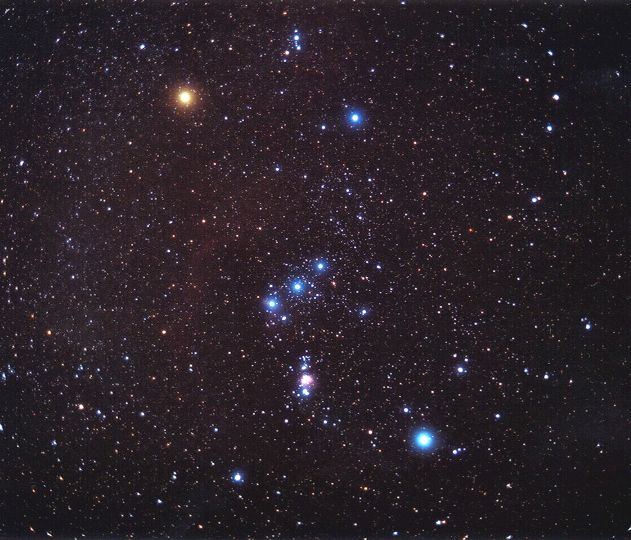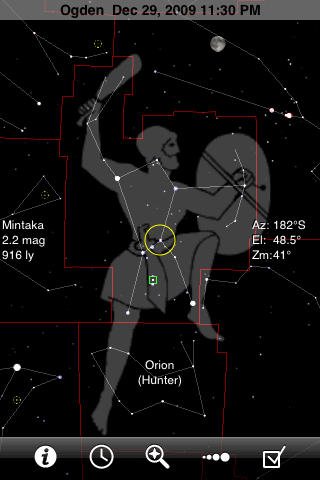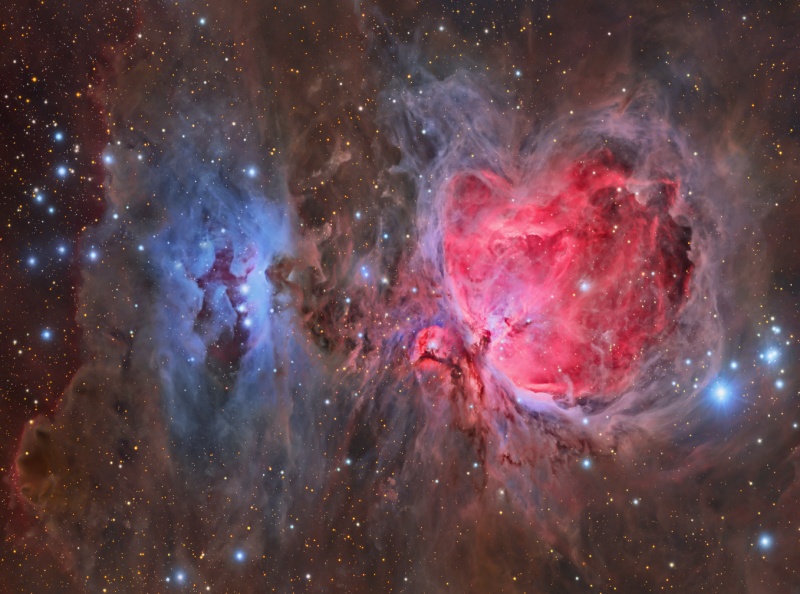 |
| A picture from NASA of the constellation Orion. The three stars in the middle in a row are his belt. The bright one up in the upper-left-hand corner is Betelgeuse. Special camera techniques were used to get this effect. You can see more at NASA's site here: http://apod.nasa.gov/apod/ap030207.html |
So, I would like to open with a question: what is your favorite science subject? Is it the stars - astronomy? Dinosaurs and fossils - paleontology? Birds, insects and animals - biology and zoology? What interests you in science the most?
Now, back to "B" for "belt" - Orion's Belt. Orion is the constellation for which this site is named. Orion is "the hunter" in the ancient Greek interpretation of the constellations:
 |
| Image from Weber State University's website. |
The three stars that make up Orion's belt are named Alnitak, Alnilam, and Mintaka. They are all blue giants, the hottest, brightest, and most massive types of stars in our universe.
Just below Orion's belt is Orion's sword. The brightest of the central "stars" isn't a star at all, but a nebula, the birthplace of stars. The nebula in Orion is called "Great Nebula of Orion," and contains at least 700 stars. You may recognize the image of the Great Nebula of Orion below.
 |
| Do you recognize this image? You should. The Great Nebula of Orion is the background of this blog! Read more on NASA's pages here: http://apod.nasa.gov/apod/ap021220.html |
Stat mech. I've always been in awe of the notion that the way you count particles determines their aggregate mathematical behavior.
ReplyDeleteWell, sort of but not really. Are you referring to statistics or statistical mechanics?
DeleteIn statistics, yes, the way you count, how you count, what methods you use to measure what you count can have a profound effect on the results of what you're measuring. That's particularly true if you make assumptions about a population that don't turn out to be true.
But there's a deeper, more "real," more profound aspect that comes out in statistical mechanics, particularly a branch of mathematics called "stochastic differential equations."
In stochastic differential equations, the "randomness" of the group creates its predictability. No joke - that's how, for example, diffusion works. You cannot know the behavior of the individual particles in diffusion. That's totally random. But you can use that type of "randomness" to predict the behavior of the system with beautiful accuracy.
Totally, totally blew my mind when I took stochastic differential equations and found out all those eloquent, clean equations you can learn in diffy eq can be derived from these random process. A very, very smart man named Ito figured out the bulk of how to do that.
Oh, I feel like a goof, Scotty. "I" will be on statistical mechanics. Sorry about that! Did not realized you were answering my question.
DeleteI suppose it's chemistry. Always loved, e.g., NaCl, +1 electron on the Na finding its way to the deficient -1 Cl. It's so arithmetic, and vaguely romantic.
ReplyDeleteROG, ABC Wednesday team
:-) Chemistry has a bit of poetry to it, definitely. So... my C post will be on a topic in chemistry for you. Thanks for dropping by!
DeleteUh...science? Stopped taking it in grade 10. But I do enjoy stuff like oceanography. And I can find the Big Dipper! Does that count? lol Have a great week,
ReplyDeleteLeslie
abcw team
Great! Oceanography was one of the major topics of my PhD thesis (entitled "Mathematical Models of Proterozoic Biogeochemistry.")
DeleteSo, I'll find a topic for you in "D" on oceanography - something about animals or life in the ocean.
Great pictures and info.
ReplyDeleteNot too versed in Science but do love learning about animals and the world we live in.
Thanks for dropping by! I'll write something in "E" for you on animals.
DeleteOk Orion's belt just reminded me of MIB !! But yes I do have a little interest in astronomy !!
ReplyDeletePhenoMenon, ABCW Team
Astronomy? I'll be teaching some of that next semester. I'll do my "F" post on astronomy.
DeleteGreat choice for B day. My favorite science class was titled "conservation of natural resources". I guess that counts as a subject of sorts. Carver, ABC-Wed. Team
ReplyDeleteOooh, not easy. But I'll still try to give you an "F" topic in conservation. Thank you for stopping by!
DeleteI meant "G" post. G will be on the conservation of natural resources.
DeleteBeautiful!
ReplyDeleteSet of B's
Rose, ABC Wednesday Team
Thanks for stopping by!
DeleteInteresting.
ReplyDeleteDefinitely Botany and Natural History. Loved it all my life before I even knew it was a science. Other sciences? Nah -- not for me!
ReplyDelete:-) Then "H" will be on botany. Thanks for stopping by!
DeleteI actually look forward to the later winter/early spring every year so that I get to see Orion again. The city lights drown out the details, but I'm happy still with the dregs. My ABC Wednesday this week is Begonia Pope.
ReplyDeleteThank you for dropping by. Would... you like a letter and a subject? The people above got one. :-)
Delete